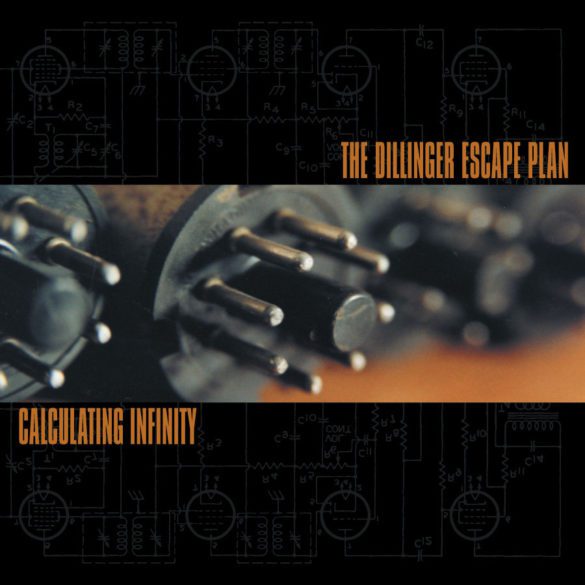
Fight Fire with Fire is a new ongoing series on our site where we’ll pit two classic genre albums against each other to definitively figure out which one is better. We’re taking two albums that are basically 10s, two albums that just might both be in our Hall of Fame, and trying to figure out which one is that much better, which one is a 10.1 out of 10.
“But they’re both great!” you’ll say. Yes, these albums are the best of the best. But one is always better. Plus, we love these sort of exercises, and also love watching you battle each other to the death in the comments, so how could this possibly end poorly?
Today, we’re looking back at two Hall of Fame-inducted metalcore albums: Botch‘s We Are the Romans and The Dillinger Escape Plan‘s Calculating Infinity. Both these albums are hallmarks of the genre. They are both albums I’ve lived with since they came out and have loved dearly, even, uh, intimately. These are two classic releases from two bands who will never be forgotten. This won’t be easy.
You’re thinking these albums can’t be pitted against each other; they’re both classics. That last part is true. But when two albums are side by side, one album is always better. So let’s get our hands dirty and figure out which one it is here.

Botch – We Are the Romans
This album starts strong and stays strong… really strong. Opener “To Our Friends in the Great White North” is a massive statement of intent, a song that proves the strength of not just Botch circa 1999, but of the best of the entire metalcore genre at the time. It’s smart, it’s intense, it’s heavy. “Mondrian Was a Liar”’s weird riffing and “Transitions from Persona to Object”’s weirder riffing showcase Botch’s experimental, angular side: these songs present as post-punk at times, but it doesn’t take long for the band’s jagged, barbed-wire metalcore to take over.
Those first three songs are a totally legendary opening trio in metalcore. From there, the band takes a breather with the awesome “Swimming the Channel Vs. Driving the Chunnel” and then the chaos of the excellent “C. Thomas Howell as the Soul Man” and album highlight (one of many) “Saint Matthew Returns to the Womb,” a song that sums up the driving noise that was this era of Botch perfectly.
“Frequency Ass Bandit” has huge groove and swagger, and its climax proved that no one had the weird time signatures down better at this point than Botch did. This album is just perfect song after perfect song after perfect song; its sequencing is a thing of beauty too, with the breathing room in the songs coming right when we need it and never staying for too long.
Contextually, this album was huge when it dropped, ushering in a new era of hardcore and metalcore, in tandem with Hydra Head Records, who were really at the forefront of forward-thinking extreme music at the time, showing that things can be professional, things can look and sound great, and things can sonically be progressive but still annihilate.
The last two songs are exercises in endurance: the 10-minute “Man the Ramparts” starts off as nothing, turns into a song (with one of the best riffs on the album), collapses into a bizarre noise-rock march and stomp, then devolves back into chaos. It feels like a bonus track every time until you sit down and really break it down and realize this is a great way to end the album. The 7:30 untitled final track is a throwaway, and, man, I wish it wasn’t there, the song doing nothing but killing momentum every time I play this otherwise flawless album.
On We Are the Romans, Botch managed to throw down just the right amount of tech weirdness and emotionally cathartic metalcore, which just stuns me every single time I spin it. The production is excellent, crystal clear but with just enough of a raw edge to it, just letting the band do exactly what they had to do at this point: ragged but spot-on extreme music, extreme catharsis, extreme mind-bending. Many days, I think this album is metalcore’s apex.
Then I remember Calculating Infinity.

The Dillinger Escape Plan – Calculating Infinity
Speaking of context and of stunning, holy shit: “43% Burnt.” I can’t think of one song that turned the underground music world on its ear as much as that one did in the last couple decades (although DEP’s “The Mullet Burden” came close a bit earlier). But first, The Dillinger Escape Plan’s debut album starts off with “Sugar Coated Sour,” which follows through on the promise of sucker-punching 1998 EP Under the Running Board, right down to the nursery-rhyme-on-crack riff, the band definitely operating at max capacity here, this album immediately sounding like the work of machines gone awry, but the gears clanking together in a perfect storm.
Then, yes, “43% Burnt.” If metalcore has an anthem, this is it, this song absolutely standing the test of time as not just a technical whirlwind, but as a fantastically composed song. I mean, “fantastically composed song” is NOT a phrase I use often when discussing metalcore of this era. DEP nailed it here. Total classic.
Not that songs like “Destro’s Secret” (insane riffing, memorable vocal lines) or “The Running Board” (another one with extremely memorable parts, a groove that you can actually hang your hat on, and wild sample usage) are slouches either, because even though this album is mainly known for being outrageously technical, there are songs to be found here. But this album is far more of a tech-fest than Botch’s record is, and as such it connects differently: Botch worms its way into your heart and soul; DEP just hammer your face in.
I like how the title track gives at least a moment of reprieve with its weirdo instrumental stylings; this odd song is actually tons of fun to listen to and to try to air drum along with, and to fail miserably at every single time.
“*#..” and “Weekend Sex Change” are, unfortunately, throwaways, the band attempting to provide breathing room but really just making us antsy for the next real song to come along. They’re okay, but they don’t have much impact. Like the final song closing off We Are the Romans, these are misses.
The problem with Calculating Infinity is that it operates on one setting: complete destruction. The band is playing at a technical level that is astounding and head-spinning, and they do it straight for much of the album. It’s incredible but it doesn’t connect with me as much as Botch’s album does. It’s just not as well balanced as We are the Romans; the respite is there, yes, but it doesn’t work quite as well. It’s not a long record, but it can sometimes feel like it. The band knew it, too, offering up more dynamics and better songwriting across the board on future albums. Still, when I’m in the mood for total chaos, Calculating Infinity is tops.
Like every one of these we will ever do, this wasn’t easy. I love both of these records dearly. But one of them has proven to be more listenable in more situations, has wormed its way into my life just one inch deeper than the other, and that’s We are the Romans. Botch tapped into something with this record that is so unique, so timeless, and connects with the listener in such a personal way. We Are the Romans is an absolute monster of progressive metalcore, without peer and without care, and today, it has emerged triumphant.




